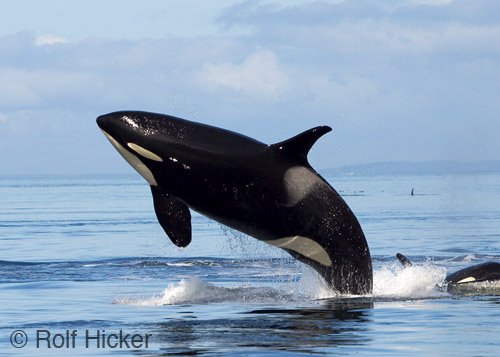 The blue is the largest animal to ever have lived on Earth. Whalers have reported this whale to being over 100 feet long and weighing over 150 tons! The is a mammal, because it has milk, hair, and the embryo develops in crustaceans like krill or copecods. The estimated numbers for the whale is at about 7,000 through 13,000, which are very low and make this animal endangered. The whalers killed thousands of whale, and their numbers have been rising very slowly since that time period. In 1946 the International Whale Commissions (IWC) was set up to put guidelines on whaling nations. The reason this whales population has dropped so dramatically is because of the first whaling expeditions.whaling have been hashed out in the news recently when anti-whaling advocates assaulted a Japanese whaling ship who then responded with water canons to an effort to thwart the attack. The debate continues to escalate with other recent events such as the high seas collision of the Shonan Maru 2, a Japanese whaling vessel, with the Ady Gil, an anti-whaling boat owned by the Sea Shepherd Conservation Society.
The blue is the largest animal to ever have lived on Earth. Whalers have reported this whale to being over 100 feet long and weighing over 150 tons! The is a mammal, because it has milk, hair, and the embryo develops in crustaceans like krill or copecods. The estimated numbers for the whale is at about 7,000 through 13,000, which are very low and make this animal endangered. The whalers killed thousands of whale, and their numbers have been rising very slowly since that time period. In 1946 the International Whale Commissions (IWC) was set up to put guidelines on whaling nations. The reason this whales population has dropped so dramatically is because of the first whaling expeditions.whaling have been hashed out in the news recently when anti-whaling advocates assaulted a Japanese whaling ship who then responded with water canons to an effort to thwart the attack. The debate continues to escalate with other recent events such as the high seas collision of the Shonan Maru 2, a Japanese whaling vessel, with the Ady Gil, an anti-whaling boat owned by the Sea Shepherd Conservation Society.The primary argument for whaling comes from Japan, as they have the largest whaling operation in the whole world. Other countries such as Norway, Iceland, the Danish Faeroe Islands, and St. Lucia and St. Vincent & the Grenadines also support whaling. While Japan currently catches whales under the guise of scientific research, they desire to return to commercial whaling operations with seemingly few or minor limits on the quantities and types of whales to be caught.
One main argument for whaling is that it is a historical right. The idea that people have been doing it for years seems like an effective one for those who want to continue hunting whales. There are some cultures who believe it is a cultural right to kill whales. This argument for whaling is granted as acceptable when speaking about small native tribes who might take one to two whales a year. It is less acceptable when applied to larger countries who take up to 1,000 whales a year.
There are several arguments against whaling. It is easier to discover and flesh out these arguments because the majority of the world seems to agree with them.
First and foremost is the argument against whaling based on animal cruelty. In one method, whales are separated from their pod, surrounded by a semi-circle of boats, and then driven to the beach. Once beached, the whale is cut down the spinal cord with a sharp knife, severing major arteries along the way.
Another argument against whaling is that many whales are endangered species. According to Earth’s Endangered Creatures, there are 11 endangered species of whale. They are the beluga whale, blue whale, bowhead whale, finback whale, gray whale, humpback whale, killer whale, narwhal, right whale, sei whale, and sperm whale. The counter argument is that it is the non-endangered minck whale which is most commonly sought so it does not matter that these other whales are protected. Unfortunately, though, some of the 11 endangered species of whale do show up on some whaling lists.
Very few people dispute the right of aboriginal cultures to whale. This is largely because they have extended histories of whaling, catch relatively few whales compared to the major whaling countries, and because the International Whaling Commission does not prohibit them from whaling.
In conclusion, the arguments for whaling are found in research, culinary motivations, and historical culture. The arguments against whaling are found in animal rights and whale species longevity.
To stop this from happening to any other species of whale, the United States listed a number of whales that included the whale, on endangered species list. The smaller species of the whale, known as the pygmy whale live in the ocean Unfortunately, they waited too late for the whale because their numbers were so low. Some interesting facts about the whale is that, their oil was used for perfume, lubrications, soap, and candy. Whales are now protected throughout the world by whale laws because their numbers were so low. If it wasn't for the caring people of IWC and other animal rights activist these gentle animals would probably be extinct. The whale is almost extinct in the northern part of the

